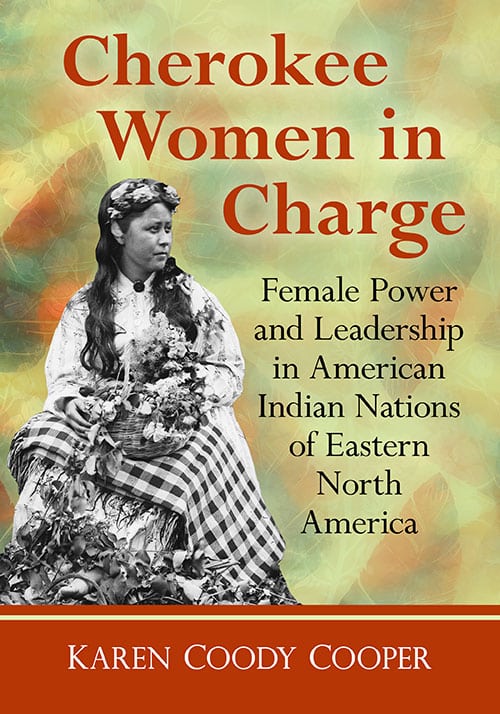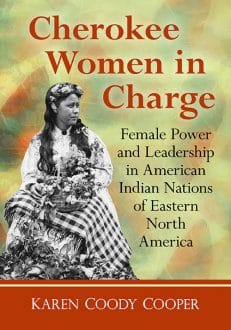Cherokee Women in Charge
Female Power and Leadership in American Indian Nations of Eastern North America
$49.95
In stock
About the Book
Cherokee women wielded significant power, and history demonstrates that in what is now America, indigenous women often bore the greater workload, both inside and outside the home. During the French and Indian War, Cherokee women resisted a chief’s authority, owned family households, were skilled artisans, produced plentiful crops, mastered trade negotiations, and prepared chiefs’ feasts. Cherokee culture was lost when the Cherokee Nation began imitating the American form of governance to gain political favor, and white colonists reduced indigenous women’s power. This book recounts long-standing Cherokee traditions and their rich histories. It demonstrates Cherokee and indigenous women as independent and strong individuals through feminist and historical perspectives. Readers will find that these women were far ahead of their time and held their own in many remarkable ways. Instructors considering this book for use in a course may request an examination copy here.
About the Author(s)
Bibliographic Details
Karen Coody Cooper
Format: softcover (7 x 10)
Pages: 245
Bibliographic Info: 38 photos, bibliography, index
Copyright Date: 2022
pISBN: 978-1-4766-8818-3
eISBN: 978-1-4766-4638-1
Imprint: McFarland
Table of Contents
Acknowledgments vi
Introduction 1
Part I: Cherokee Female Empowerment 5
1 Elements Empowering Cherokee Women 6
2 Terms of Endearment: Matriarchy, Matrilineal, Matrifocal 11
3 Under the Female Sun: Mythologies and Ethos 21
4 Female Sexuality in Cherokee Matrilineal Society 29
5 The Labor of Cherokee Women 37
6 Ghigooie and the Influence of Matrilineal Power 42
7 Visualizing Cherokee Women and Their Homes 48
8 A Bushel of Chestnuts for a Petticoat: Barter and Trade 53
9 Perspective: The Iroquois Great Law and Jigonsaseh 58
10 Beloved War Women’s Authority: Life or Death 65
11 Ingenuity in Creative Arts: Weaving and More 74
12 Creating Life: Pleasure and Pain 82
13 Chiefs’ Hospitality Provided by Women 88
14 Women’s Ceremonial Life: Festivals, Dance and Games 93
Part II: Women of Other Matrilineal Cultures of Eastern North America 101
15 Sixth through 16th Century: Yucatan, Hispaniola and Cofitachequi 102
16 Seventeenth Century Women of Powhatan, Manhattan, Delaware and Pocasset 113
17 Eighteenth Century “Sinicker” Queen, Creek Empress and Canadian Mohawk Lady 124
18 Nineteenth Century Choctaw Little Blue Hen and Chickie and Chockie’s Chickasaw Mother 133
19 Two Twentieth Century Seminole Female Chiefs 138
Part III: Enduring Strengths Continue in Post-Matrilineal Era 143
20 Nineteenth Century Cherokee Cultural Evolution: Legislation, Missionaries, Patriliny 144
21 Cherokee Women Enduring the Trail of Tears 153
22 Enterprising Susan Coody and the California Gold Rush 158
23 The Civil War’s Cherokee Female Refugees 163
24 Institutions in the Absence of Former Matrilineal Networks 170
25 Suffrage: A U.S. Senator’s Mother and a Tammany Hall Heiress 180
26 Cherokee Women: Preservers of Heritage, History and Language 187
27 Modern Era War Women: In the Line of Defense 192
28 Sustaining Ancient Skills and Developing New Arts 197
29 Great Depression Survivors: A Migrant Mother and a Space Engineer 206
30 Twentieth Century Female Cherokee Chiefs: Wilma Mankiller and Joyce Dugan 210
31 Excelling in a Post-Modern World: Poet Laureates, Prima Ballerinas and More 216
Afterword: Be Indomitable: What Is Cultural? What Is Biological? 220
References 223
Index 233
Book Reviews & Awards
• “Full of informative anecdotes about the lives and accomplishments of women past and present… There’s also important background material about Cherokee survival and adaptation in the wake of the forced migration known as the Trail of Tears. …an engaging work that covers subjects that deserve close study”—Kirkus Reviews
• “What Richard Powers’ The Overstory and Suzanne Simard’s revolutionary Finding the Mother Tree: Discovering the Wisdom of the Forest did for botanical science, Karen Coody Cooper does for social science and gender politics”—Robert Franklin, McFarland Founder and Editor-in-Chief.





